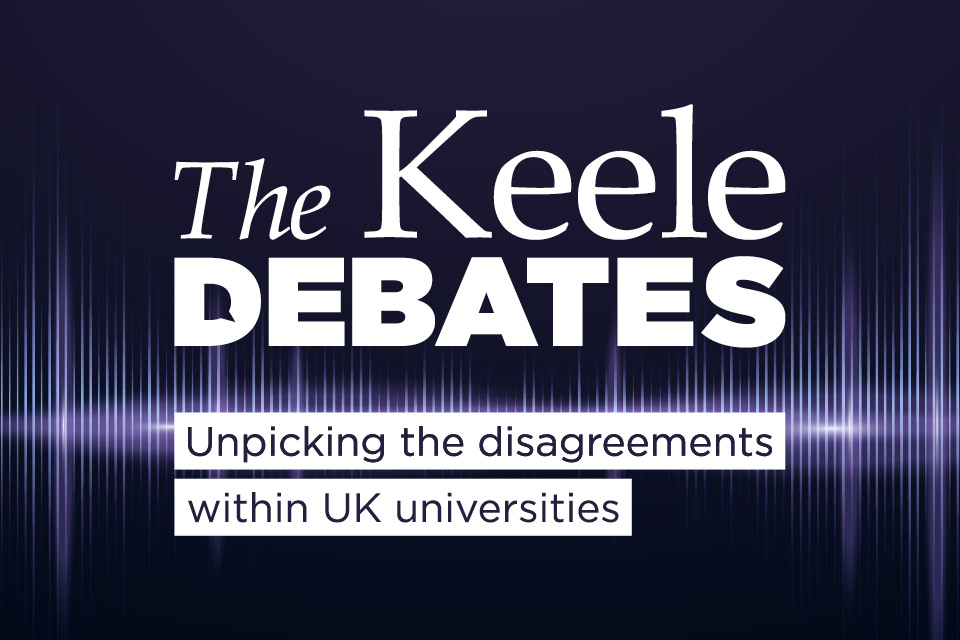Accessibility
Keele University is committed to increasing the accessibility of information to all users, including visitors with visual or motor impairments. This statement outlines our activities and achievements so far in increasing accessibility.
Accessibility statement for keele.ac.uk
This accessibility statement applies to keele.ac.uk.
This website is run by Keele University. We want as many people as possible to be able to use this website and are committed to ensuring digital accessibility for people with disabilities. For example, that means you should be able to:
- Zoom in up to 400% without the text spilling off the screen
- Navigate most of the website using just a keyboard
- 'Skip to main content' using tab on your keyboard
- Listen to most of the website using a screen reader
- We also aim to make the website text easy to understand.
AbilityNet has advice on making your device easier to use if you have a disability. AbilityNet is a UK charity that exists to change the lives of disabled people by helping them to use digital technology at work, at home or in education.
Measures to support accessibility
We tested our website for accessibility during the design process, and we carry out similar testing on the live site.
We use and validate against HTML 5, whilst using structured semantic markup with CSS 2.1 and CSS 3 for page design.
Where Javascript, jQuery or CSS is used to present information, we strive to provide fallbacks. Progressive enhancement is applied to all content and layout.
How accessible is our website?
We know some parts of this website aren't fully accessible:
- Some website elements may cut off text if increased line spacing is turned on or off whilst on that page
- Most older PDF documents are not fully accessible to screen reader software
- Some videos do not have captions
- Some parts of our forms (such as checkboxes, radio controls and list boxes and combo boxes) are difficult to use just with a keyboard, or with screen readers such as JAWS and voice command software such as Dragon
- On some pages we use Google Maps, YouTube, and Facebook chat which screen reader users and keyboard users can find difficult to use
What to do if you can't access parts of this website
We’re always looking to improve the accessibility of this website. Please contact us at support.web@keele.ac.uk if you:
- Need information on this website in a different format such as accessible PDF, large print, easy read, audio recording or braille
- Find any problems that are not listed on this page
- Think we are not meeting the requirements of the accessibility regulations
We’ll consider your request and get back to you within five working days.
Enforcement procedure
If you are unhappy with the response you receive in relation to an accessibility-related issue, you can make a complaint to support.web@keele.ac.uk.
The Equality and Human Rights Commission (EHRC) is responsible for enforcing the Public Sector Bodies (Websites and Mobile Applications) (No. 2) Accessibility Regulations 2018 (the ‘accessibility regulations’). If you’re not happy with how we respond to your complaint, contact the Equality Advisory and Support Service (EASS).
Technical information about our website's accessibility
Keele University is committed to making its website accessible, in accordance with the Public Sector Bodies (Websites and Mobile Applications) (No. 2) Accessibility Regulations 2018.
This website is partially compliant with the Web Content Accessibility Guidelines version 2.1 AA standard, due to the non-compliances listed below.
Non-accessible content
The content listed below is non-accessible for the following reasons.
Non-compliance with the accessibility regulations
No records are available.
Disproportionate burden
- It cannot be guaranteed that all prerecorded audio and video content is accompanied by a text alternative, captions, audio description, sign language interpretation, audio description. This doesn’t meet the following success criterion
- 1.1.1 (non-text content)
- 1.2.1 (audio-only and video-only - prerecorded)
- 1.2.2 (captions – prerecorded)
- 1.2.3 (audio description or media alternative - prerecorded)
- 1.2.5 (audio description - prerecorded)
- 1.2.6 (sign language - prerecorded)
- 1.2.7 (extended audio description - prerecorded)
- 1.2.8 (media alternative - prerecorded)
- Our website search, powered by Google Site Search, is not fully accessible. However, with this being a third-party tool which we neither fund nor develop it is not possible to correct.
- On some pages we use third-party embeds such as Google Maps and YouTube videos, which screen reader users and keyboard users can find difficult to use. However, with these being third-party tools which we neither fund nor develop, it is not possible to correct.
- Keele.ac.uk contains legacy pages on old templates. We cannot guarantee that all legacy content is accessible. However, if you would like to request specific legacy content in an accessible format, please contact us at support.web@keele.ac.uk.
- Certain course pages include third-party embedded UniStats data. Unfortunately, there is no available mechanism to pause, stop, or conceal this transition. As this is an external embed, Keele University does not have the capability to make updates to it.
- Some images do not have a text alternative, so people using a screen reader cannot access the information. This fails WCAG 2.1 success criterion 1.1.1 (non-text content). We have ongoing accessibility audits, CMS staff training, and guidance on accessibility, and so when we publish new content our use of images should always meet accessibility standards. However, we cannot guarantee that all legacy content meets the criteria.
- Some parts of the forms on the site (such as checkboxes, radio controls and list boxes and combo boxes) are difficult to use with screen readers such as JAWS and voice command software such as Dragon. This doesn’t meet WCAG success criterion 4.1.2 Name, Role, Value (Level A). Due to the third-party nature of the forms, Keele University does not have the capability to make updates to it, but we run periodic checks for accessible alternatives where possible.
- It cannot be guaranteed that all user interfaces and graphical objects meet the necessary contrast ratio. This doesn’t meet WCAG success criterion 1.4.11 (non-text contrast). We have an audit process in place to find, check, and fix issues, and contrast accessibility is a responsibility of all our web editors. However, we cannot guarantee that all old legacy content meets the criteria.
- It cannot be guaranteed that images of text have not been used. This doesn’t meet WCAG success criterion 1.4.5 (images of text). As part of our regular accessibility audit, all images from the homepage down to level 3 are manually checked.
- Course Information Documents (PDF) may not all be fully accessible during 2025.
Content that’s not within the scope of the accessibility regulations
- PDFs and other documents - Many of our older PDFs and Word documents don't meet accessibility standards. For example, they may not be marked up so they are accessible to a screen reader. This doesn’t meet WCAG 2.1 success criterion 4.1.2 (name, role value). The accessibility regulations don’t require us to fix PDFs or other documents published before 23 September 2018 if they’re not essential for active administrative processes. Any new PDFs or Word documents we publish will meet accessibility standards.
- Video captions - Some of our older videos don't have accurate edited captions or transcripts. This doesn’t meet WCAG 2.1 success criterion 1.2.1 (audio-only and video-only pre-recorded), 1.2.2 (captions pre-recorded), 1.2.3 (audio description or media alternative pre-recorded) and 1.2.5 (audio description pre-recorded). The regulations do not apply to recorded videos published before 23 September 2020. However, while these videos are not subject to the legislation, we have carried out an audit of all our videos and have begun a process of updating captions and adding full transcripts. Any new videos we publish will have edited captions and transcripts.
Preparation of this accessibility statement
This statement was prepared in January 2020. It was last reviewed on 19th August 2025.
This website was last tested for accessibility in August 2025 by Keele University. The next full review is scheduled for August 2026.
Our tests are carried out on samples of 50 pages, including our website scaffolding, by:
- Pa11y, which checks our content against the W3C (World Wide Web Consortium) WCAG 2.0 and Digital ADA (Americans with Disabilities Act) accessibility standards.
- aXe (axe-core)
- Screaming Frog SEO Spider, which checks for image accessibility, as well as broken links
- Wave.webaim.org Chrome plugin
In January 2020, we also had a sample of key pages tested, both manually and automatically, for accessibility by the Digital Accessibility Centre.
We chose the sample of web pages to test by using Google Analytics (to test our most visited pages), as well as a random sample, and our website scaffolding (as mentioned above).
What we’re doing to improve accessibility
We have a rolling programme of updating content in accordance with the guidelines set out by the WCAG.
We continually monitor the accessibility compliance of our site and have made the fixing and improvement of the site part of our daily digital housekeeping activities.
All CMS Web Champions (editors) have access to our website style guide which includes guidance on how to produce accessible web pages and content. This guidance is reviewed on a regular basis.



